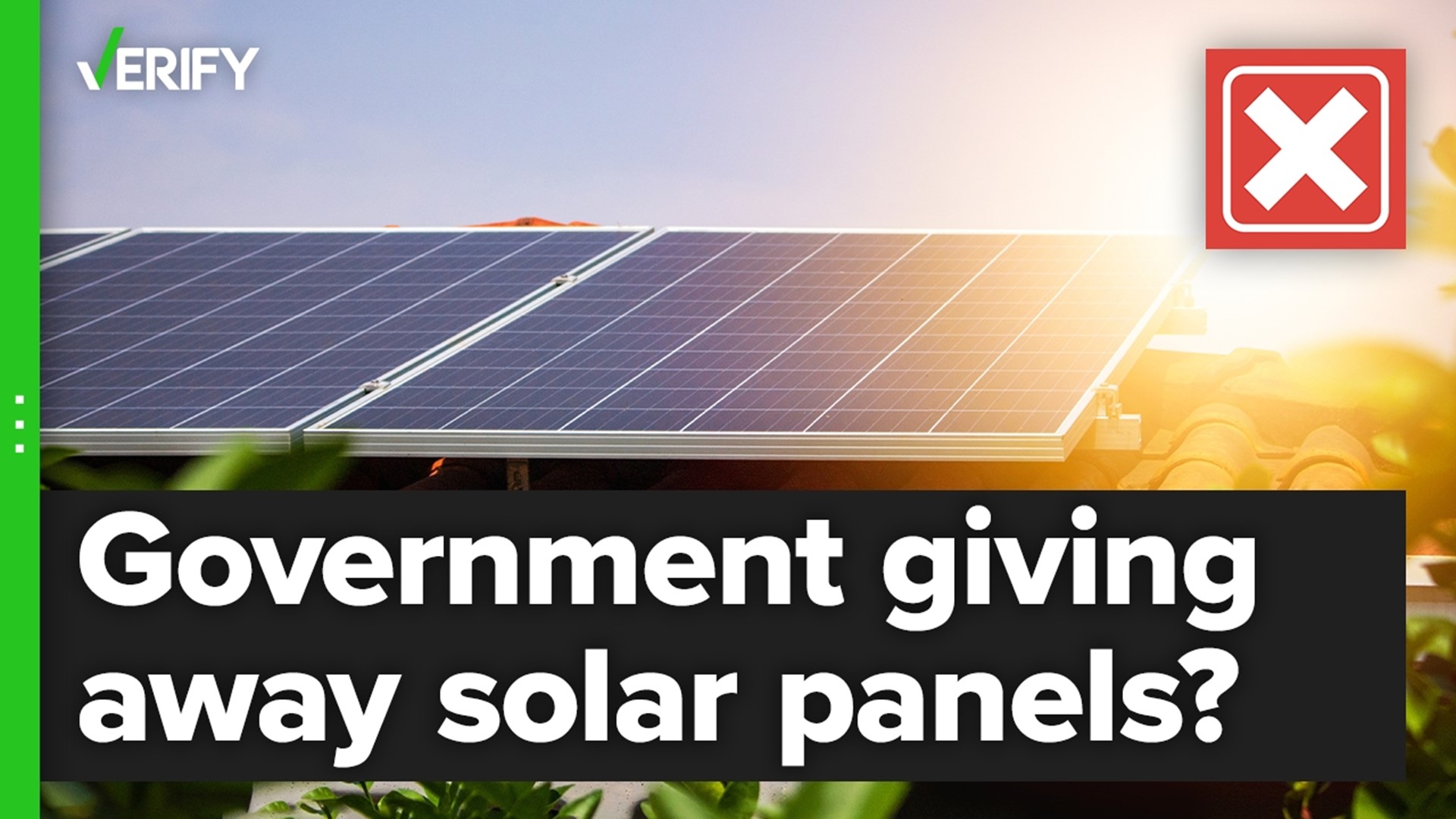Some homeowners, particularly those in sunny states, may take an interest in solar panels as a potential way to save money on their electric bills and cut down on their carbon footprint. So it’s not unusual that a person who is already looking to save money might be tempted by the many ads that populate Google and social media advertising “free solar panels.”
Several viewers asked VERIFY whether these ads were real. Christal asked if the government is giving away free solar panels. Larry asked, “Everywhere on the internet, I am seeing ads from solar companies claiming a free government program to pay for home solar systems for free. Is this true?”
THE QUESTION
Is the federal government giving away free solar panels?
THE SOURCES
THE ANSWER
No, the federal government is not giving away free solar panels. There are private companies offering to install solar panels on homes for free, but the homeowner is only renting the panels and still has to pay for their electricity.
WHAT WE FOUND
Both the Illinois Citizens Utility Board and online energy marketplace EnergySage tackle these kinds of misleading ads directly, saying there’s no such thing as free home solar panels. They say these kinds of ads are for power purchase agreements, PPAs for short, in which you rent the panels installed onto your home.
A solar power purchase agreement, the Environmental Protection Agency (EPA) explains, is an arrangement in which an outside developer owns, operates and maintains a solar power system, and a host customer agrees to keep the system on their property and purchase the electricity at a set rate for a set period of time.
The company arranges for the design, permitting, financing and installation of a solar energy system on a customer’s property at little to no cost, the Solar Energy Industries Association (SEIA) specifies. The developer will then sell the power generated to the host customer at a fixed rate that is typically lower than the usual local rates. The contract usually lasts for 10 to 25 years, at the end of which the customer can choose between extending the PPA, removing the solar system or buying the system for themselves.
A company entering into a PPA benefits from the sale of the electricity the system generates and from tax benefits and other incentives awarded to the company for operating the system.
Some of the “free solar” ads refer to solar leases, in addition to PPAs. In a solar lease, the hosting homeowner pays a fixed monthly payment, $150 per month, for example, based on the system’s production.
“You’re entitled to use all the power the system produces, and you’ll probably reduce the amount of power you buy from your utility,” the FTC says. “If the system produces more power than you need and your utility uses net metering, the utility may pay you or credit your account for power the system returns to the grid. Your contract may allow your monthly payment to increase over time.”
But in a PPA, the customer agrees to pay a fixed price for all of the electricity generated, even if the customer doesn’t use all of it themselves. The price is set per kilowatt-hour (kWh).
“Unlike with a lease, you don’t pay to use the system, and don’t automatically get all the power it produces,” the Federal Trade Commission (FTC) explains. “You pay for the power the system generates, at a price the PPA provider sets. Some PPA providers say they charge a reduced rate for power because they get the tax credits and incentives.”
The FTC cautions potential host customers to carefully read the contract before signing a PPA for this very reason. “Most people will pay more over the lifetime of a solar lease than if they purchased and financed a system,” the Illinois Citizens Utility Board says.
The U.S. Department of Energy maintains several federal financial assistance programs to encourage consumers to use solar energy. While these can include tax credits and rebates, none of the programs give a person free solar panels and no-cost installation. There are some programs that may exist at the local level, such as a Washington, D.C., program that installs solar panels for households below 80% of the area median income threshold.
Solar company Unbound Solar notes that a homeowner who signs a PPA cannot claim rebates or tax credits from either the federal government or a state government since they are not the owner of the solar energy system when they install one through a PPA.
More from VERIFY: How to stay cool in a heat wave: 5 Fast Facts

